Whether your blog is a marketing tool for your brand or a personal blog you started to share your passion, you want people to see it. You put a lot of work into writing and editing posts and finding just the right images to put alongside them. For all that work to pay off, you need people to find those posts.
And the main way people go looking for content like yours online is by searching Google or other search engines. A 2019 survey from Path Interactive found that 77% of people use Google over three times a day.
For most blogs, showing up in the search results requires doing some link building.
Link building is one of the most important and hardest parts of search engine optimization (SEO). Google sees links back to your blog as an indication that people like and respect your work. Each external link from a quality website is a signal to the search engines that your website is quality too.
It’s largely because link building is the hardest part of SEO to do well that it’s so important. Everyone can do the easy stuff; building high-quality links is how you become more competitive.
Here are fifteen link-building strategies you can use to help boost your blog’s authority and make headway in the search engines.
1.Make Sure Your Blog Content Is Link-Worthy.
Every other tactic you try will depend on having this one in place. Websites add links to pages from other sites when they’re confident the linked page provides something of value to their readers. Writing about topics people care about and packing value into each post you write are prerequisites for link building.
While much of link building happens offsite, the work of earning links starts with the content creation process. When you’re brainstorming blog topics to cover, think both about what people want to read and what types of content sites are likely to link to. And during the writing stage, be vigilant to make sure the blog posts you create are accurate, well written, and include information your audience will get something out of.
2. Do a Quote Roundup Post.
You’ve seen posts like this. They’re the ones that include quotes from a bunch of different experts on the same general subject. They’re popular for end-of-year posts (The Top <Insert Industry> Trends of 2020) or just any post that’s trying to pack a lot of different tips and insights into one place. We’ve even done a few of these here at Virtue Media.
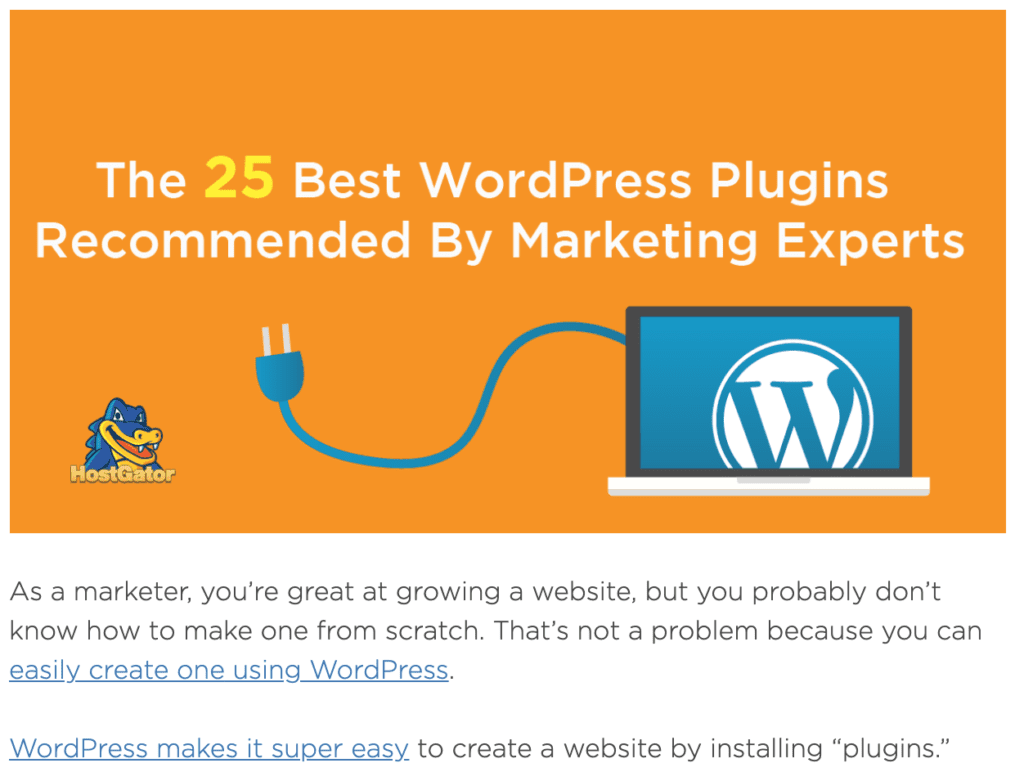
Influencers in your industry are often willing to contribute to these because they get a link back to their site and a chance to show their expertise on the subject in question. That benefits you because they’re that much more likely to share the post with their networks and/or link back to it in future posts on their own website.
Quote roundup posts won’t guarantee you new links, but they’re a good way to get other influencers to help promote a post on your blog, thus bringing your content to a new audience. Those extra eyes on your blog may translate to more followers and new relationships, both of which are things that tend to correlate with more links.
3. Write Guest Posts.
A guest post is a blog post you write for someone else’s blog that’s valuable to their audience. As long as the other blog covers topics that are relevant to your blog and target audience, it’s a good opportunity to reach new people and include a link or two back to your blog.
There are even services that can help you with this, such as Link-able, where you can hire writers to help you with guest posts.
Guest posting takes a lot of work – you have to identify the right blogs to pitch, convince them to publish your work, and write a really good post that appeals to their followers – and do all this for free. But if your post is good and the other blog is a good fit for the people you’re trying to reach, you could gain new followers and more traffic in addition to the links you build back to your blog.
One thing that’s really important to remember here is to be careful how much you self-promote or link back to your blog in a guest post. A lot of blogs won’t bother publishing your post if it seems promotional or spammy. Stick with one or two relevant links tops, and only mention your brand if or when it makes natural sense to do so.
4. Accept Guest Posts.
Hear me out – I know it sounds like this is the best way to let other people build links on your site, but each of those people is likely to then promote your blog.
As with quote roundup posts, this may not immediately earn you a bunch of new links, but it will help you build relationships with people who are more likely to promote your blog and link back to your posts over time.
A lot of link building ultimately comes down to building relationships within your online community. Accepting guest posts is a tactic that helps with that. And it gives you free content to include on your blog, which can reduce some of the workload of keeping it current.
5. Look for Resource Pages.
A lot of blogs and businesses will put together pages or posts that collect helpful resources their readers might appreciate. Any pages that do this for websites that are like yours could be an opportunity for a link.
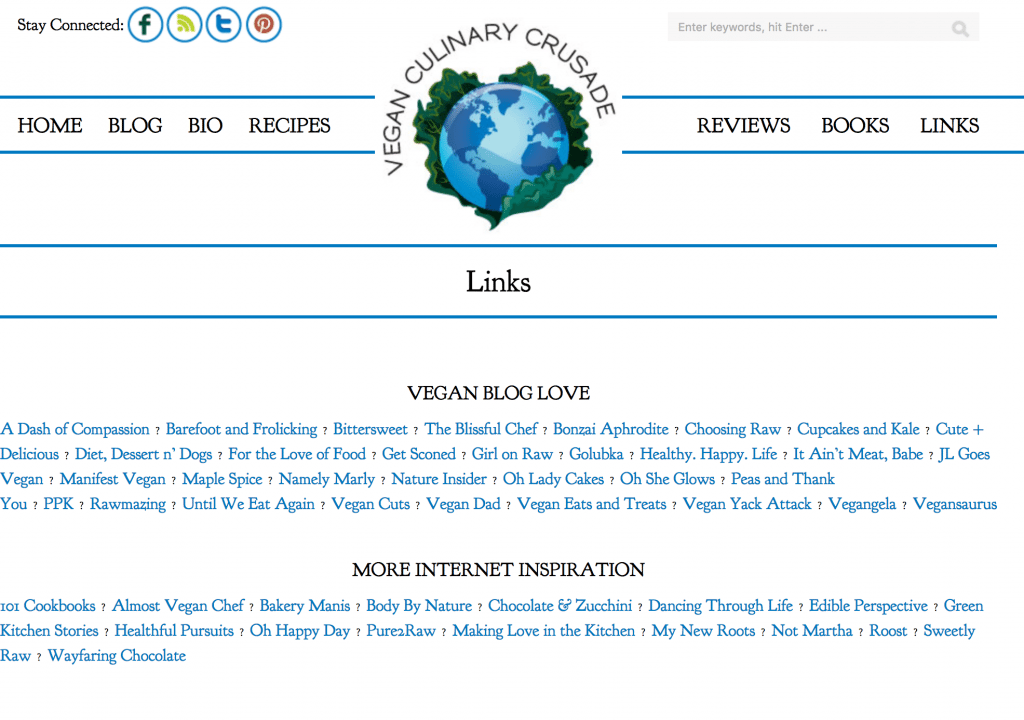
To identify pages like this, think of the main keywords that describe what your website does and get to searching. If your blog is full of healthy vegan recipes, search for terms like vegan blog resources, vegan blog links and other variations on those terms. For every relevant resource page you find, see if you can find contact information for the site webmaster and craft a pitch for why your website deserves to be added.
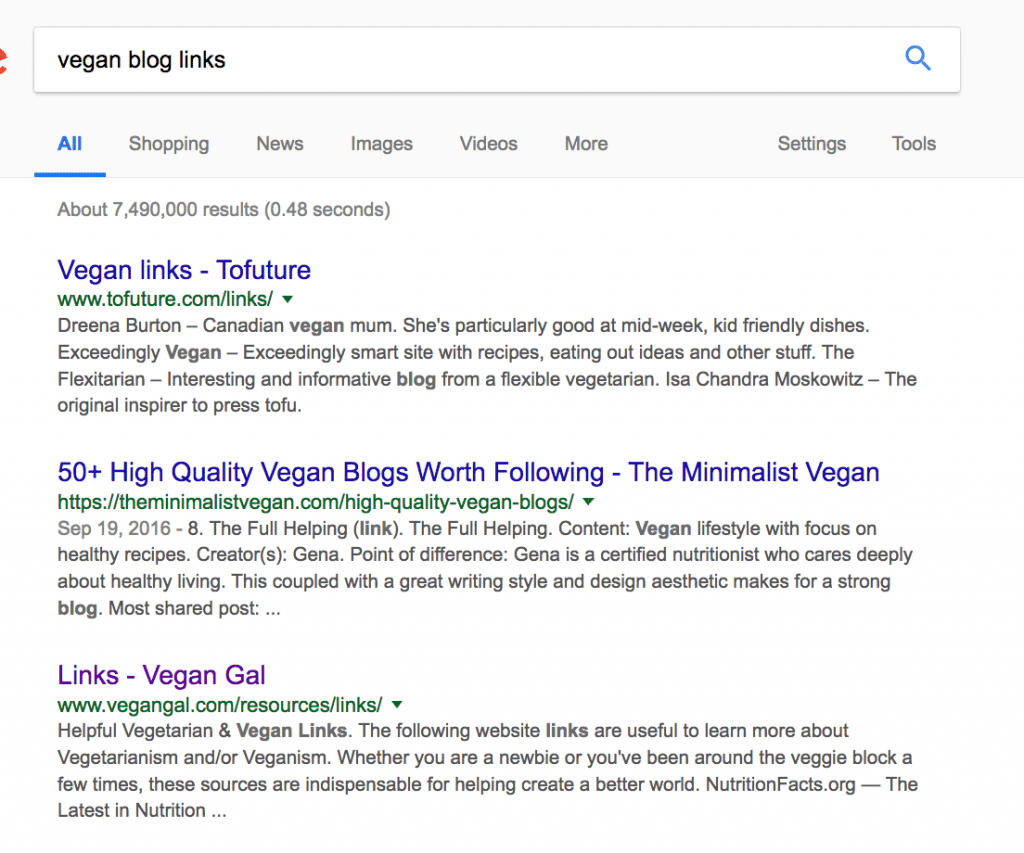
You should expect a lot of your emails to be ignored. You’re essentially reaching out to a stranger and asking them to do work as a favor to you. But if you send out 100 emails and get two new links on high authority websites, the effort will be worth it.
6. Find Broken Links.
Broken links are annoying for website visitors and owners alike. Every time someone clicks on one on your website, it’s a bad experience for them that reflects badly on you (unless you follow these tips to make your 404 experience a positive one).
Broken link building is based on the idea that by alerting a website owner to a broken link on their website and suggesting a good replacement, you’re helping them out. Where most link building strategies amount to asking other website owners to do you a favor, in this case the favor’s more reciprocal.
Finding examples of relevant broken links around the web can be difficult, but there are a number of broken link tools that help you find broken links on a particular website, as well as SEO tools that deliver reports of broken links based on keywords or topic areas.
For each relevant broken link you find, you can either contact the webmaster to recommend a piece of content you already have that makes a good replacement, or create a new piece of content if you don’t already have one.
7. Create Your Own Original Statistics.
Writers love statistics. They’re a good, solid way to back up any point you make in an article or blog post. As such, original research and data are some of the best types of content for earning new links.
Consider any questions your readers are likely to have that you can help answer with data. Then work on putting together a survey that will do just that.
Before you do the work of creating a survey on your blog, check to make sure there’s a need for the information you’ll be gathering. If a big, established brand in your space has already conducted a similar survey, your work will be worth less. Most websites will likely link to theirs rather than yours. But if you can figure out some questions and topics that no one’s adequately covered in their data yet (or ones where the only data available is now super old), then your research could become the go-to stat. That will definitely earn you links.
Be warned that this approach takes a lot of time and effort. But it tends to pay big dividends when it comes to earning links.
8. Create a Statistics Roundup.
If you like the idea of publishing research, but lack the resources for a project that big, the next best thing is to collect existing statistics your audience is likely to be looking for into one blog post.
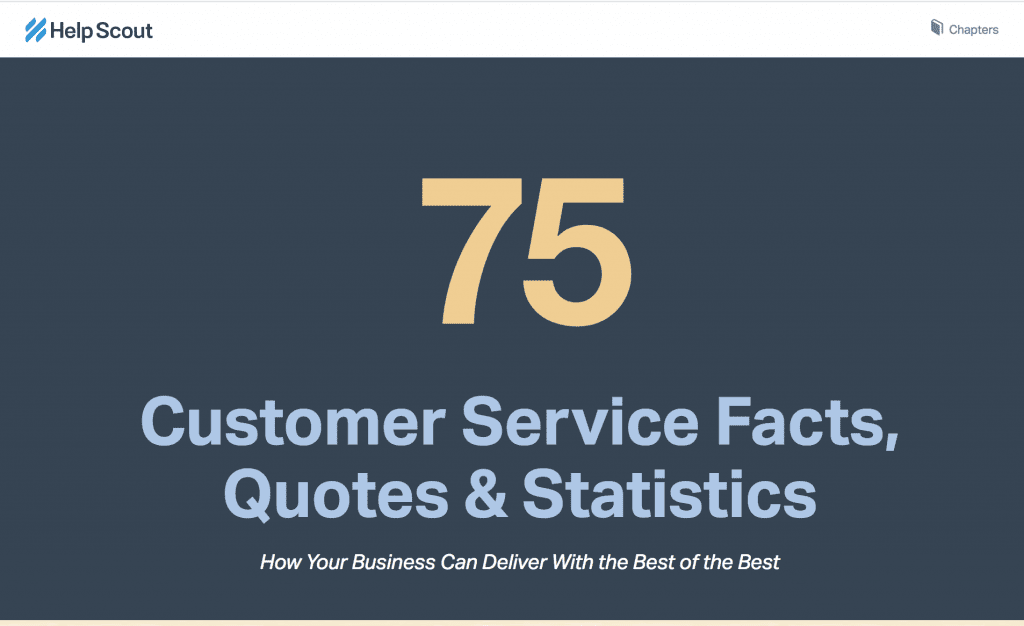
By bringing a large number of statistics together into one place in an easily accessible format, you’re providing value to the people (including writers) out there looking for that information. If writers find the stat they’re looking for on your website – even if you’re not the one that originated it – you may be the one to earn that link.
Some writers will follow the link you include back to the original source to check its authenticity and will prefer to use that link instead in their post. But don’t let that keep you from including that link back to the source – a stat that doesn’t point back to its source is less trustworthy (and less likely to attract links).
In some cases though, that stat will be behind a form or shared in a format that’s less user-friendly than your post, which will make linking back to your blog post the better choice for their readers. This is especially true if you find a way to add value, such as with the helpful graphics HelpScout included in their statistics roundup.
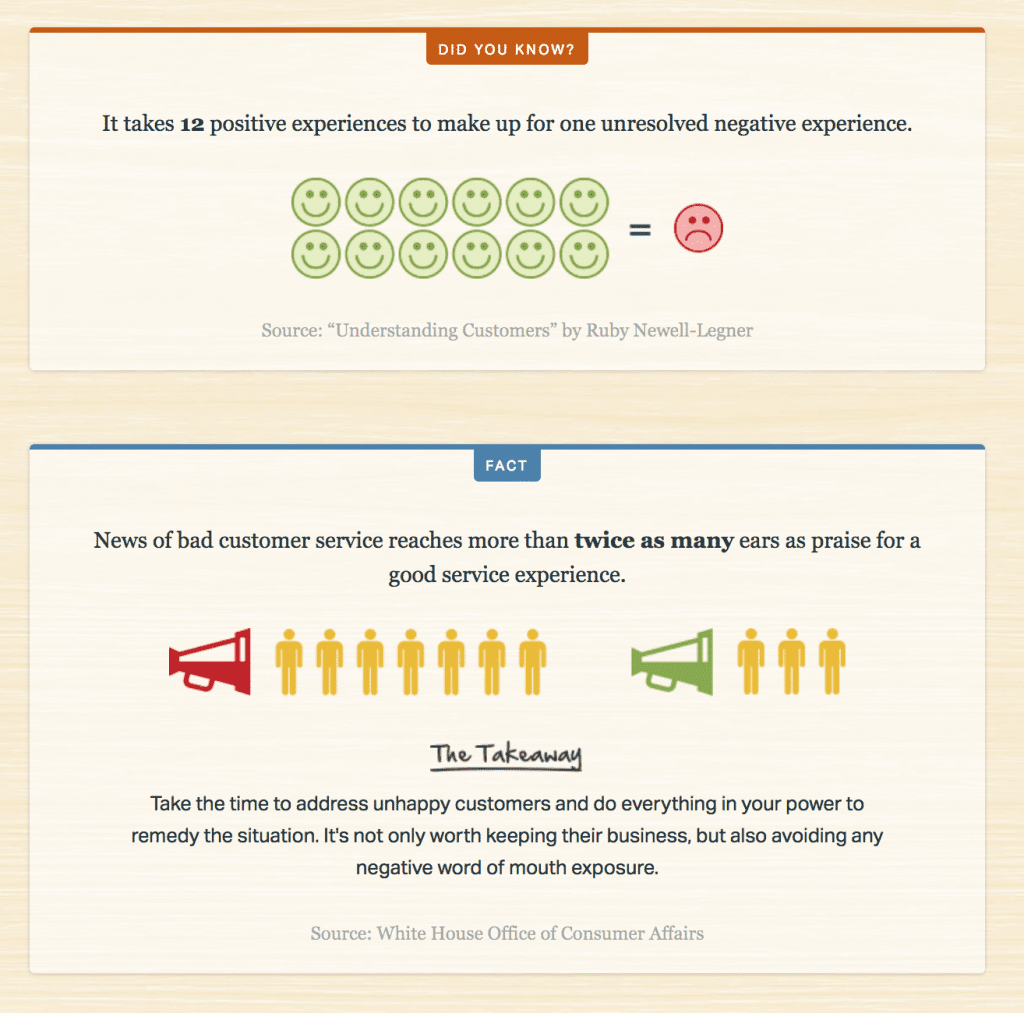
Pro tip: if you go this route, make a habit to go back and update your roundup post every year. A lot of the time when writers are looking for statistics to back up a point they’re making, they want something recent. That often means limiting their search to content updated within the last year. Making sure your post includes up-to-date data makes it much more valuable and linkable.
9. Create and Give Out Awards.
You know what happens when a person or company receives notice that they’ve won an award? In most cases, they want to publicize it. They may write about it on their blog, send out a press release, or promote their win on all their social media channels – in short, they send a bunch of links and promotion back to the source.
To be clear, well known brands or awards are more likely to get that response, but even little known brands or blogs that create awards can get a similar reaction, simply because people like getting awards. It gives them something to brag about and point to as evidence that they’re doing well.

Why not create your own award? Give it a snazzy name (possibly one that sounds something like your blog) and start looking for other blogs, influencers, companies, or people in your niche that you think should be winners. Create a logo (or hire a graphic designer to do so) and encourage them to post it on their websites. It’ll earn you both links and general goodwill in the community.
10. Become a Guest Expert.
If you can become one of the people other bloggers turn to when looking for expert sources, as when they do quote roundup posts, you’ll gain links each time someone quotes or interviews you. This strategy takes time. Building up a reputation as an expert in your field isn’t some quick tactic you can pull off overnight. But you can take a few steps to start getting more established:
Help a Reporter Out connects journalists and bloggers with the experts they need to support their pieces. You can sign up to receive emails that collect all the pitches journalists have submitted for a given time period, and then respond to any that are a fit for your expertise. This can lead to opportunities where you’re interviewed and quoted in a piece, often with a link back to your website.
- Participate in relevant Twitter chats, then offer to host.
Twitter chats are when people in a community gather at a specific time on Twitter to talk about a relevant topic together, using the chat’s hashtag. They’re both a great way to meet other people in your community, and a potential opportunity to establish your thought leader bona fides by offering to host. Hosting signals to participants that you’re an expert in the subject matter you’re discussing, and increases the likelihood people will turn to you when looking for information on that topic.
- Research podcasts in your topic area, and let them know you’d be happy to come on.
Podcasts are an increasingly popular medium for exploring all kinds of topics. For bloggers, they can be a novel way to share your expertise with a new audience and build up your reputation. Learn what podcasts are covering topics similar to the ones you talk about on your blog. Listen to a few to see which ones you like, then contact the hosts to see if they’d be open to having you on to talk about a topic you’re an expert on.
- Look for speaking opportunities.
Speaking is an entirely different skill set than writing, so you may feel this is out of your wheelhouse. But if you’re open to trying, giving talks at events in your industry or topic area can be a powerful way to build up your reputation as an expert. Consider starting small, with local groups and events. Once you’re more confident in your speaking abilities, then go bold and apply for some of the bigger conferences in your space.
11. Write Reviews or Product Comparisons.
Whatever topic you cover on your blog, there are probably some products that your readers consider relevant. And product reviews and comparisons are very useful to readers who want to make sure they’re making the right choice when deciding which product to buy. They can always see what the brands behind the products have to say on their own website, but that’s worth less than unbiased information from a third party.
Somebody with a photography blog will have readers wanting information that helps them buy the right camera. Pointing them toward a specific camera you’ve used and know is great, and explaining everything about it that works well and all the little (or not so little) things about it that don’t work well is exactly what they need to hear before buying. Even better, if you’ve tried out three similar cameras and can explain how they’re different and their relative strengths and weaknesses, you’re providing triple the information to help people make a decision.

Not only will your reviews or product comparison posts provide value to people in your target audience, but they’ll be likely to attract links as well. The brands selling those products have an interest in linking to any positive reviews of their products. And any writer working on content where they know that information will be valuable to their readers, such as say, a blog post on how to get started as a photographer, will have good reason to link back to your detailed post.
12. Use the Skyscraper Technique.
The search rankings are a competition and some keywords are much more competitive than others. If you can identify keywords that are relevant to your topic, but currently only have lackluster or mildly good content in those top spots, that’s a keyword you can easily compete with.
The skyscraper technique is about finding those top ranking blog posts that aren’t as good as your content, then creating a truly awesome blog post that’s obviously better.
Once you’ve got your awesome blog post done and published, you can reach out to the websites that linked to the mediocre content that’s currently ranking and recommend that they consider replacing that link with your more thorough and helpful content. If the original post has obvious errors or is outdated, make sure to include that in your case.
13. Connect with Other Bloggers.
You’ll notice that a couple of the earlier recommendations on this list prioritize building relationships. That’s because relationships are a huge part of link building. People are less likely to link to a stranger from a blog they’ve never heard of than they are to someone they’ve interacted with and know is legit. If you retweet other bloggers in your space, share their content, leave comments on their blog, or find ways to collaborate with them – then you’ll get on their radar.
Once they know you, they’ll be more likely to pay attention to your content and share it or link to it anytime they’re impressed by what you wrote or know the link will add something valuable to their post.
This is a long game. You can’t introduce yourself to a blogger in your space today and expect a link tomorrow, but building relationships now and starting to become a part of the larger community will pay off over time.
14. Use “link roundups” to get backlinks.
What is a link roundup? A link roundup is a list of curated content, links in this case, linking to your favorite content on a topic.
Link roundups are typically located at the end of a blog post and are a good way to provide a conclusion, as well as linking to other resources that will be helpful for your readers.
Link roundups are also a great way to build connections with other websites and bloggers, often encouraging them to share your content since they have been mentioned.
15. Consider Syndicating Your Blog Content.
Content syndication is when the content you already published on your blog is also published somewhere else, with a link back to your website. Some websites with big audiences will gladly set up content syndication agreements with smaller sites, because it’s a way for them to publish more content while doing less work.
For bloggers, the benefit to content syndication is knowing more people will see your blog posts, and some will like them enough to follow you back to your blog.
Content syndication can be as simple as re-publishing your best blog posts into LinkedIn or Medium, or it can mean entering into agreements with popular publications in your space. Either way, it can double as a way to build links and to drive more traffic to your blog.
Start Building Links to Your Blog
None of these strategies are particularly easy. All of them will require a time commitment and some significant work. But if you want your potential readers to find your awesome blog posts, this type of work is the difference between only being found by those who already know you, and showing up in the search engines for the topics you cover.




![Yes, B2B Websites Can Use Personalization Too [Here’s How]](https://mdvirtue.com/wp-content/uploads/2022/02/Yes-B2B-Websites-Can-Use-Personalization-Too-Heres-How-400x250.jpeg)

0 Comments